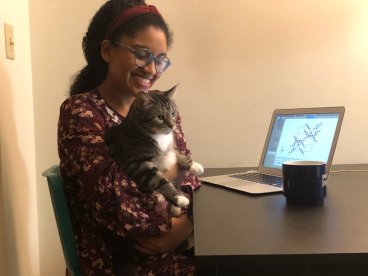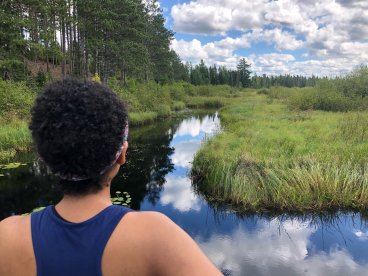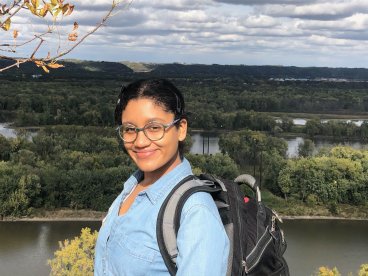Meet CTC: Brianna Collins

November 12, 2020 -- Brianna Collins is a fourth-year graduate student in the Goodpaster group. An Arlington, Texas, native, she earned her undergraduate degree in chemistry and mathematics from St. Edward’s University in Austin, Texas.
Brianna’s research focuses on catalysis for electrochemical systems. Electrochemistry is the study of chemical processes that can be driven by electrons, which allows for chemical reactions to be driven by electricity. It’s important to study electrochemistry because it can replace traditional chemical processes that utilize fossil fuels to drive the chemistry, and provide greener chemical production.
“I hope that by increasing the efficiency of the generation, transmission, and utilization of energy, I can reduce our rate of electrical usage and decrease our ecological impact,” she said.
To do her research, Brianna uses the resources at the Minnesota Supercomputing Institute. To model catalysis, she uses density functional theory. Brianna recently received a Phillips 66 Fellowship for graduate research in an energy-related field.
In her spare time, Brianna likes to run. “It’s good exercise and a great way to explore the city.” At home, she plays with her cats, experiments in the kitchen, and does art. She adds, “Not that there’s much spare time!”
How did you become interested in studying chemistry, and what gets you the most excited about your field?
Chemistry has never been easy for me, and I’m drawn to a challenge. As my understanding of the nature of chemistry grew, I became more inspired by its fundamental nature. Understanding the basic building blocks of the universe has deepened my appreciation of nature and given me a fresh view on life.

Why did you choose the University of Minnesota, and what led you to join your current research group?
While I was an undergraduate, I was lucky enough to meet some members of the University of Minnesota Department of Chemistry. Their drive and depth of knowledge left such an impression on me that I wanted to be a part of their work.
What is your favorite part about living in the Twin Cities?
The Minneapolis Institute of Art is one of the finest museums I have ever seen. I could go there every week and never get bored. I love the vibrant energy of the Twin Cities, the verdant natural beauty of the parks and lakes, and the depth of the food scene. There’s always fun to be had and beauty to be discovered here.
What do you enjoy most about your research?
More and more I’m finding that the work I do in chemistry is applicable far beyond any bound that I have placed upon it. So far, it’s been interesting to watch others reach conclusions that I thought were very basic, but instead, have very far-reaching implications. I know that I'm just learning things other people have discovered right now, but I hope to fill that same role for those who will come after me.
What are you most proud of about your academic career so far, and what’s one thing you’d like to achieve in the future?
I’m really proud to have gotten this far—my Ph.D. is within grasp! In the future, I would really like to connect my work with humanitarian causes. For example, I want to improve the standards of living around the world in order to free populations from the stresses of securing basic necessities. This would mean finding energy solutions that work on a local scale because the massive infrastructures we use for energy production usually aren't present.

What are you passionate about?
I'm passionate about improvement. I don't like the feeling of holding still, and would rather move forwards. Whether this applies to me, my work, or how I think things ought to be, I feel that it's best to stay in motion.
What drives you to be a better scientist?
I am greatly challenged by the breadth and depth of this field. Some days I feel like I’ll never know enough to feel as though I know anything, and knowing that I have more to learn and discover fills me with energy each day.
What advice do you have for aspiring scientists?
Don’t let the pace of your work frustrate you so much that you stop loving the work. Nothing can be achieved without patience and persistence, but anything can be achieved with them.
